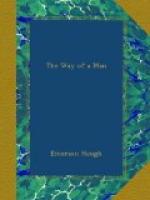“Then it is to be war?” he asked, quietly.
I shrugged my shoulders. “You heard me.”
“Very well!” he replied, calmly, after a while. “But listen. I don’t forget. If I do not have my pay voluntarily in the way I ask, I shall some day collect it in my own fashion.”
“As you like. But we Cowles men borrow no fears very far in advance.”
Orme rose and stood beside me, his slender figure resembling less that of a man than of some fierce creature, animated by some uncanny spirit, whose motives did not parallel those of human beings. “Then, Mr. Cowles, you do not care to go back down the valley, and to return to the girl in Virginia?”
“You are a coward to make any such request.”
His long white teeth showed as he answered. “Very well,” he said. “It is the game. Let the best man win. Shall it then be war?”
“Let the best man win,” I answered. “It is war.”
We both smiled, each into the other’s face.
CHAPTER XXIV
FORSAKING ALL OTHERS
When finally our entire party had been gotten across the Platte, and we had resumed our westward journey, the routine of travel was, for the time, broken, and our line of march became somewhat scattered across the low, hilly country to which we presently came. For my own part, our progress seemed too slow, and mounting my horse, I pushed on in advance of the column, careless of what risk this might mean in an Indian country. I wished to be alone; and yet I wished to be not alone. I hoped that might occur which presently actually did happen.
It was early in the afternoon when I heard her horse’s feet coming up behind me as I rode. She passed me at a gallop; laughing back as though in challenge, and so we raced on for a time, until we quite left out of sight behind us the remainder of our party. Ellen Meriwether was a Virginia girl with Western experience, and it goes without saying that she rode well—of course in the cavalry saddle and with the cross seat. Her costume still was composed of the somewhat shriveled and wrinkled buckskins which had been so thoroughly wetted in crossing the river. I noticed that she had now even discarded her shoes, and wore the aboriginal costume almost in full, moccasins and all, her gloves and hat alone remaining to distinguish her in appearance at a distance from a native woman of the Plains. The voluminous and beruffled skirts of the period, and that feminine monstrosity of the day, the wide spreading crinoline, she had left far behind her at the Missouri River. Again the long curls, which civilization at that time decreed, had been forgotten. Her hair at the front and sides half-waved naturally, but now, instead of neck curls or the low dressing of the hair which in those days partly covered the fashionable forehead, she had, like a native woman, arranged her hair in two long braids. Her hat, no longer the flat straw or the




